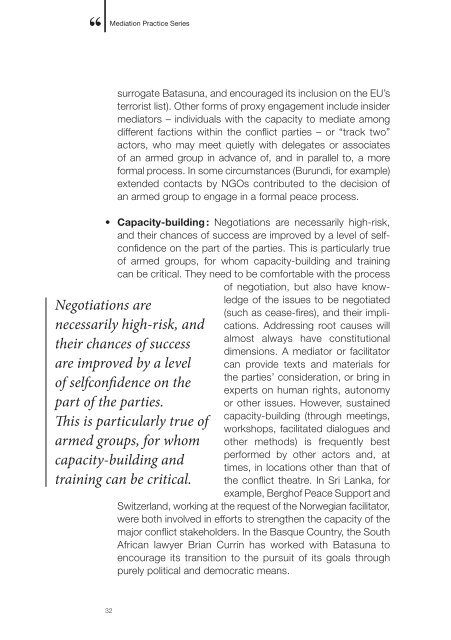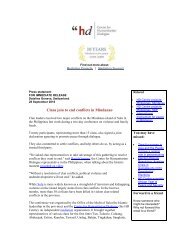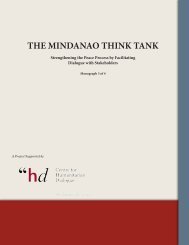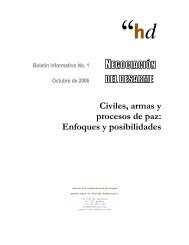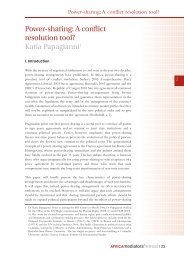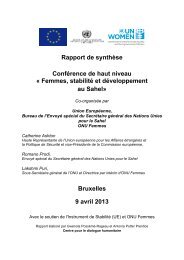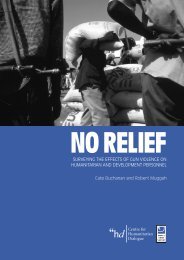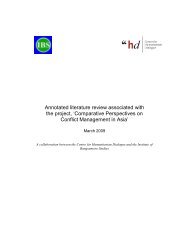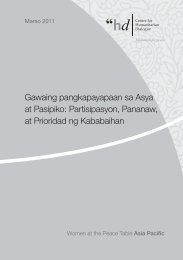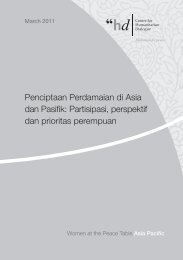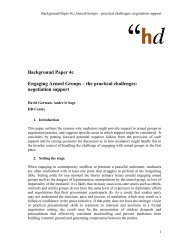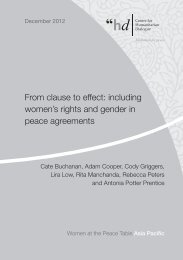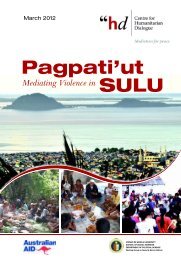Engaging with armed groups - Centre for Humanitarian Dialogue
Engaging with armed groups - Centre for Humanitarian Dialogue
Engaging with armed groups - Centre for Humanitarian Dialogue
- No tags were found...
You also want an ePaper? Increase the reach of your titles
YUMPU automatically turns print PDFs into web optimized ePapers that Google loves.
Mediation Practice Seriessurrogate Batasuna, and encouraged its inclusion on the EU’sterrorist list). Other <strong>for</strong>ms of proxy engagement include insidermediators – individuals <strong>with</strong> the capacity to mediate amongdifferent factions <strong>with</strong>in the conflict parties – or “track two”actors, who may meet quietly <strong>with</strong> delegates or associatesof an <strong>armed</strong> group in advance of, and in parallel to, a more<strong>for</strong>mal process. In some circumstances (Burundi, <strong>for</strong> example)extended contacts by NGOs contributed to the decision ofan <strong>armed</strong> group to engage in a <strong>for</strong>mal peace process.• Capacity-building : Negotiations are necessarily high-risk,and their chances of success are improved by a level of selfconfidenceon the part of the parties. This is particularly trueof <strong>armed</strong> <strong>groups</strong>, <strong>for</strong> whom capacity-building and trainingcan be critical. They need to be com<strong>for</strong>table <strong>with</strong> the processof negotiation, but also have knowledgeof the issues to be negotiated(such as cease-fires), and their implications.Addressing root causes willalmost always have constitutionaldimensions. A mediator or facilitatorcan provide texts and materials <strong>for</strong>the parties’ consideration, or bring inexperts on human rights, autonomyor other issues. However, sustainedcapacity-building (through meetings,workshops, facilitated dialogues andother methods) is frequently bestper<strong>for</strong>med by other actors and, attimes, in locations other than that ofthe conflict theatre. In Sri Lanka, <strong>for</strong>example, Berghof Peace Support andSwitzerland, working at the request of the Norwegian facilitator,were both involved in ef<strong>for</strong>ts to strengthen the capacity of themajor conflict stakeholders. In the Basque Country, the SouthAfrican lawyer Brian Currin has worked <strong>with</strong> Batasuna toencourage its transition to the pursuit of its goals throughpurely political and democratic means.Negotiations arenecessarily high-risk, andtheir chances of successare improved by a levelof selfconfidence on thepart of the parties.This is particularly true of<strong>armed</strong> <strong>groups</strong>, <strong>for</strong> whomcapacity-building andtraining can be critical.32


